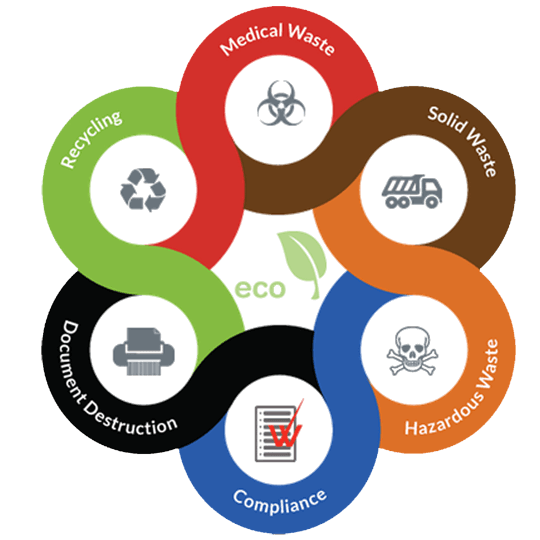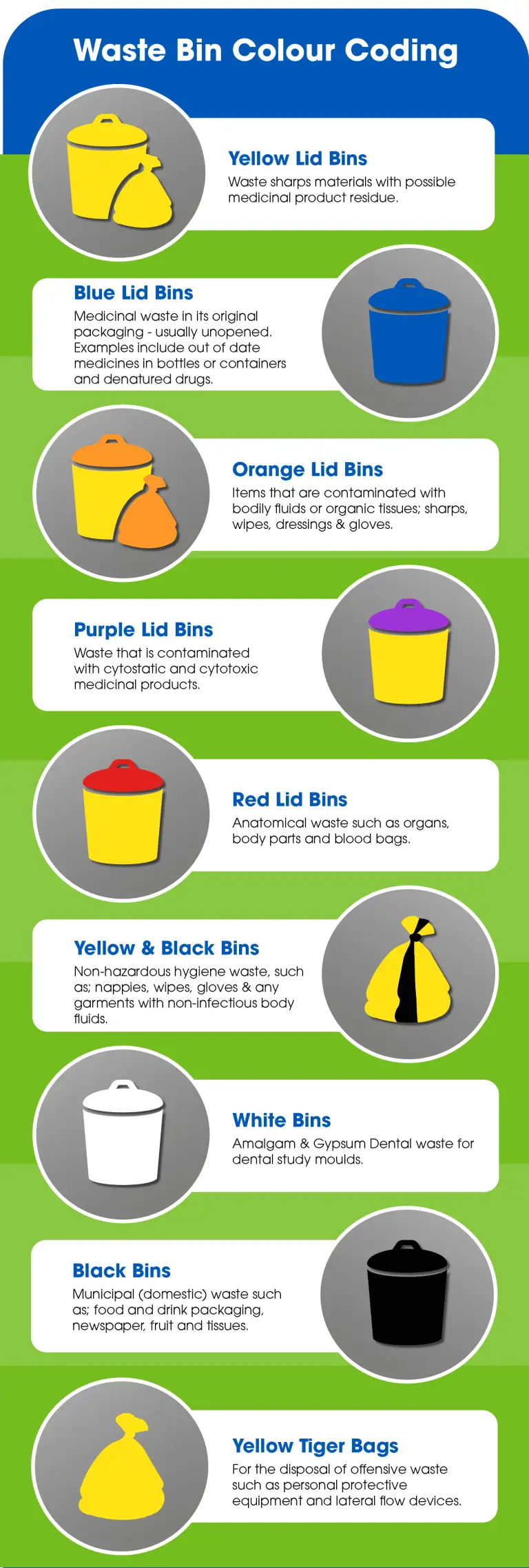Strategic Medical Waste Disposal Solutions: Supporting Safety And Security and Sustainability
Wiki Article
Making Sure Safe Handling and Disposal of Medical Waste
Guaranteeing risk-free handling and disposal of medical waste is of vital significance in health care setups. Improper administration of clinical waste can position substantial dangers to the environment, public health and wellness, and health care employees. In this intro, we will check out the relevance of proper medical waste monitoring, the threats associated with incorrect handling and disposal, as well as the guidelines and approaches that can be applied to ensure its secure disposal.Importance of Appropriate Medical Waste Monitoring
Appropriate clinical waste administration is of utmost importance in making certain the security and health of health care professionals, people, and the basic public. Clinical waste refers to any kind of waste produced by healthcare centers during the medical diagnosis, therapy, or booster shot of animals or humans. This waste can position significant wellness dangers if not managed and dealt with appropriately.
One of the key reasons why correct medical waste monitoring is essential is to avoid the spread of infectious illness. Clinical waste, such as used needles, infected dressings, and organic products, can lug harmful pathogens. If not dealt with and disposed of appropriately, these pathogens can be transferred to medical care employees, patients, waste handlers, and also the general public, bring about the potential break out of conditions.
Additionally, appropriate clinical waste management assists protect the atmosphere - medical waste disposal. Clinical waste consists of dangerous products, consisting of chemicals, pharmaceuticals, and radioactive substances. When not taken care of properly, these substances can pollute dirt, water bodies, and the air, positioning a substantial hazard to ecosystems and public health
Additionally, effective medical waste management ensures compliance with global criteria and regional policies. Governments and regulatory bodies have actually developed standards and methods to make sure the risk-free handling, storage space, transportation, and disposal of medical waste. Abiding by these policies is vital to prevent lawful repercussions and keep the track record and credibility of medical care facilities.
Risks of Improper Handling and Disposal

If clinical waste is not appropriately disposed of,People can likewise be revealed to these transmittable diseases. For instance, if polluted needles or various other sharps are not gotten rid of in designated puncture-proof containers, they may mistakenly prick individuals, resulting in prospective infections. If medical waste is not segregated properly, there is a danger of cross-contamination between various kinds of waste, further increasing the chances of illness transmission.
Improper disposal of medical waste can additionally have harmful impacts on the atmosphere and the basic public. If clinical waste is not treated and thrown away appropriately, it can infect water resources, dirt, and air, resulting in the spread of conditions and toxins. This can have lasting effects on ecosystems and public health.
Standards for Safe Handling of Medical Waste
Carrying out efficient procedures for the safe handling of clinical waste is necessary in making certain the security of healthcare specialists, clients, and the general public. These standards are critical in minimizing the risks related to the handling and disposal of medical waste, such as infections, injuries, and environmental contamination.Most importantly, medical care centers should develop an extensive waste management strategy that follows neighborhood, national, and worldwide policies. This plan should consist of clear guidelines on waste partition, product packaging, labeling, storage, and transportation. It is crucial to divide different sorts of waste, such as sharps, infectious products, pharmaceuticals, and non-hazardous waste, to stop cross-contamination and promote secure disposal.
Additionally, health care personnel have to receive extensive training on proper waste handling techniques. They ought to be enlightened on the possible risks of medical waste, the ideal use personal safety equipment (PPE), and the proper procedures for handling, transferring, and throwing away different sorts of waste.
Moreover, healthcare facilities must regularly monitor and audit their waste administration practices to ensure conformity with standards. This includes performing regular assessments, examining waste handling procedures, and offering comments and training to personnel members.
Effective Strategies for Waste Disposal
To make certain the secure handling and disposal of clinical waste, it is necessary to use effective methods for garbage disposal. Medical waste can pose significant threats to public wellness and the atmosphere if not dealt with and dealt with appropriately. Consequently, medical care centers and waste management organizations need to implement proper strategies to alleviate these risks.One reliable method for waste disposal is partition. weblink It includes separating various kinds of medical waste based upon their features. Partition enables the appropriate therapy and disposal of each waste category, decreasing the possibility for contamination or damage. Healthcare centers should offer clear standards and training to team member on exactly how to set apart waste properly.

In addition, healthcare facilities should collaborate with certified waste management firms to make certain proper disposal of clinical waste. These companies have the proficiency and tools needed to safely deal with and dispose of medical waste in compliance with regulations and best practices.
Training and Education for Healthcare Professionals
Healthcare specialists play an important duty in making certain the secure handling and disposal of clinical waste via thorough training and education. It is crucial for healthcare suppliers to have a deep understanding of the prospective threats related to medical waste and the proper methods for its monitoring. By getting correct training, healthcare experts can lessen the possible transmission of infectious illness, protect against environmental contamination, and secure both themselves and the public.
Furthermore, training programs ought to stress making use of individual safety equipment (PPE) and correct hand hygiene methods when dealing with clinical waste. medical waste disposal. Medical care experts need to understand how to correctly dispose and make use of of PPE to secure themselves from potential direct exposure to harmful products. They must additionally be educated on the significance of routine handwashing and the correct usage of hand sanitizers to minimize the spread of infectious illness
Continuing education and learning and normal updates on medical waste management practices are crucial for medical care specialists. As guidelines and regulations progress, it is important to maintain health care service providers notified about any type of modifications in protocols and ideal methods. This will make sure that they remain up-to-date and maintain a high requirement of safety and security in disposing and taking care of of medical waste.
Verdict
To conclude, appropriate handling and disposal of medical waste is important to guarantee the safety and security of healthcare experts, individuals, and the environment. Ignoring to follow guidelines and regulations can cause numerous dangers and threats. Carrying out efficient approaches for garbage disposal and supplying proper training and education for health care professionals are vital in preserving a safe healthcare setting. By sticking to these techniques, we can alleviate the possible threats connected with medical waste.Clinical waste refers to any waste produced by health care facilities throughout the medical diagnosis, treatment, or immunization of people or pets. If medical waste is not set apart effectively, there is a danger of cross-contamination between various types of waste, additional increasing the opportunities of disease transmission.
It is essential to separate various types of waste, such as sharps, contagious materials, drugs, and non-hazardous waste, to prevent cross-contamination and advertise safe disposal. WasteX Medical Waste Disposal.
To ensure the risk-free handling and disposal of medical waste, it is crucial to employ reliable strategies for waste disposal. Furthermore, medical care facilities must establish a regular waste collection and transportation timetable to protect against waste buildup and decrease the threat of accidents or contamination.
Report this wiki page